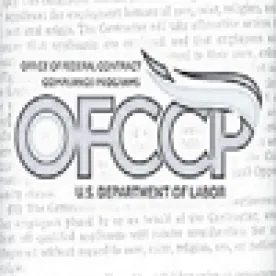Effective 18 August 2022, the Office of Federal Contract Compliance (OFCCP) revised Directive 2022-01 on “Advancing Pay Equity Through Compensation Analysis” (the Revised Directive) to provide further explanation of how OFCCP will evaluate federal contractors’ compliance with compensation analysis1 obligations. The Revised Directive also clarifies OFCCP’s authority to access documentation relating to these analyses. It explains that OFCCP will not require contractors to produce privileged attorney-client communications or attorney work product. It also articulates what information contractors will be required to provide in situations where they intend to assert privileges over the requested work product.
The Revised Directive’s clarification of what documents OFCCP can obtain regarding compensation analyses is a welcome response to requests by the federal contractor community and legal practitioners in the area, including K&L Gates in previous alerts here and here. This update provides an overview of OFCCP’s new guidance as to what compensation-analysis documentation federal contractors should provide to OFCCP throughout the audit process.
Desk Audits
Contractors selected for audit may be asked to provide OFCCP with information and data regarding hiring and compensation disparities. OFCCP reviews this information via a “desk audit” to determine if a contractor is meeting its obligations, and looks broadly at a contractor’s workforce to identify any patterns of segregation that would drive pay disparities. If the desk audit reveals any disparities in pay or concerns about a contractor’s compensation practices, OFCCP may request more information from a contractor. The Revised Directive provides more guidance as to the information that OFCCP may request, including:
-
additional compensation data;
-
follow-up interviews;
-
any compensation analyses that a contractor conducted pursuant to 41 CFR 60-2.17(b)(3); and
-
data relating to understanding compensation practices and disparities, such as information on prior experience or education, or other factors that may affect compensation, such as promotion, assignment, or steering patterns.
Compensation Analysis Documentation
OFCCP has the authority to review documentation relating to a contractor’s compensation analysis to confirm that the contractor has sufficiently evaluated its compensation practices for any race, gender, or ethnicity-based disparities. The Revised Directive encourages contractors to provide OFCCP with full compensation analyses when OFCCP identifies concerns during its compliance evaluation. However, if a contractor believes that a full compensation analysis would be protected by attorney-client privilege or by the attorney work-product privilege, the contractor may instead provide OFCCP other documentation showing it conducted the required compensation analysis. The Revised Directive suggests ways that this obligation could be satisfied without providing the full analysis, including:
-
Redacting privileged portions of the full compensation analysis, provided that the non-redacted portions include required facts;
-
Conducting a separate analysis during the relevant Affirmative Action Plan (AAP) period that does not implicate privilege concerns; or
-
Generating a detailed affidavit that “sets forth the required facts described below but does not contain privileged material.”
Regardless of the means by which a contractor seeks to fulfill its obligations under 41 CFR 60-2.17(b)(3), OFCCP has indicated that documentation must demonstrate at least the following:
-
When the compensation analysis was completed;
-
The number of employees the compensation analysis included and the number and categories of employees the compensation analysis excluded;
-
Which forms of compensation were analyzed and how the different forms of compensation were separated and/or combined for analysis;
-
That compensation was analyzed by gender, race, and ethnicity; and
-
The method of analysis employed by the contractor.
The Revised Directive also provides a list of information that it recommends contractors provide to OFCCP to assist it in assessing how a contractor evaluated its compensation systems. The recommended information includes:
-
All employee pay groupings evaluated;
-
An explanation of how and why employees were grouped for the analysis;
-
Which, if any, variables, factors, measures, or controls were considered and how they were incorporated in the analysis; and
-
The model statistics for any regressions or global analyses conducted for race, ethnicity, and gender-based variables.
Privlege Concerns
The Revised Directive also provides a more detailed explanation of how a contractor may fulfill its obligations under 41 CFR 60-2.17, when documentation of its compensation-analysis obligations falls within the attorney-client or work-product privilege. First, the Revised Directive notes that contractors cannot simply invoke privilege and provide OFCCP with no or insufficient documentation of compliance. The Revised Directive also asserts that documentation showing that contractors have complied with regulatory obligations is not inherently privileged, as they often are not “communications” covered by the attorney-client privilege.
Importantly, the Revised Directive explains that because contractors know they must make documentation of their compliance available to OFCCP, this documentation is not “confidential” and privilege would not attach to it. While the Revised Directive clarifies that it will not require the production of privileged attorney-client communications or attorney work product, any contractor invoking this privilege should ensure that the documentation they seek to withhold is, in fact, privileged. In addition, regardless of any claims of privilege, contractors should still be prepared to provide OFCCP with sufficient documentation showing their compliance with their compensation-analysis obligations. Counsel can assist contractors both by evaluating any privilege concerns with compensation analyses and by determining what documentation to provide to OFCCP.
Conclusion
Finally, OFCCP directives are ultimately subregulatory guidance and do not have the force and effect of law of a regulation. Directives state the agency’s position and are a direction from the OFCCP Director to agency employees regarding how to act or interpret regulatory provisions.
It is important to remember this point as it is possible that OFCCP may disagree with a claim of privilege under the Revised Directive. Alternatively, OFCCP could determine that proof offered by a contractor that a compensation analysis has been completed is insufficient, but OFCCP’s determination itself would not establish the point. In the event of a dispute regarding the applicability of privilege to the requested materials, the disagreement may be subject to adjudication before an administrative law judge if OFCCP brings an enforcement action. Ultimately, issues of privilege are decided by courts, so it is important to confer with counsel when engaging with OFCCP on privilege-related issues.
The Revised Directive is a positive and welcome step by OFCCP and shows the agency was listening to concerns expressed by the contractor community. Privilege facilitates contractors performing more extensive pay equity self-audits under advice of counsel and potentially using statistical techniques with more power to detect systemic concerns. OFCCP’s interest should be that all contractors conduct pay equity self-audits or in-depth compensation analyses annually, as this helps ensure compliance and enhances pay equity generally. Any attempt to limit privilege in this area is likely to decrease the amount and scope of these self-audits, potentially harming pay equity, so it is positive for pay equity that OFCCP is now taking a revised, more privilege-friendly approach.
FOOTNOTES
1 OFCCP is now referring to pay equity audits as “compensation analyses.”





 />i
/>i

